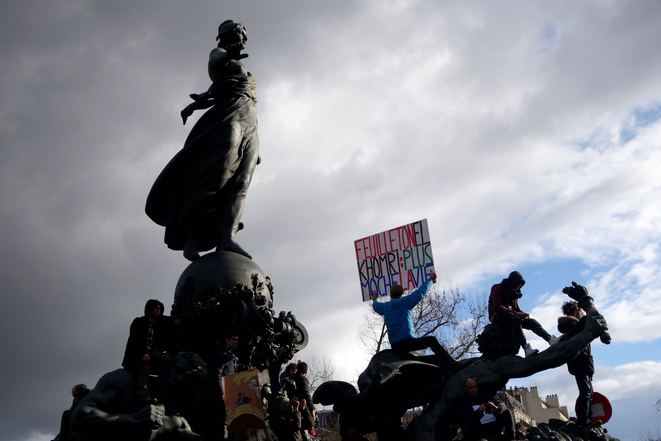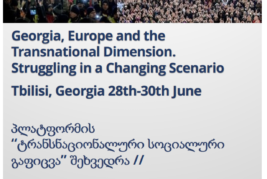
FRIDAY 21ST OCTOBER (18-21h Bourse du Travail, République)
Speakers from Sud Solidaires (France), Coordination des Intermittents et Précaires (France), Nuit Debout (France), Workers’ Initiative (Poland), Precarious Di∫connections (Italy)
The last months have seen France turned upside down by the movement against the loi travail. We have greeted it as a prolonged and massive experience of social strike, for the combination of strikes in key sectors of the economy and a social mobilization that filled the streets, the squares and the metropolitan space. While mainly directed against the loi travail, the mobilization has also addressed its world, that is a wider spectrum of issues having to do with the ways in which precarity hunts both labor and living conditions, depriving people of their possibility to choose over their future and move around autonomously. The approval of the loi travail, in line with many other labor reforms in Europe, the escalating social and political tensions which are crossing not only France but all Europe, the transnational character of austerity measures and EU crisis management pose us the problem of how to turn the French mobilization and its novelty into a transnational chance. We recognize that the loi travail is a national expression of the European neoliberal policies. As Transnational Social Strike Platform, after the first meeting in Poznan, the transnational day of coordinated action of the 1st of March and a first assembly in Paris, we thusraisethe question of how to overcome the national dimension of the struggles against these policies. In order to think together at how to change this state of affairs, we would like to discuss two different sets of questions: the first one is what we can learn, as a European movement, from the French mobilization in terms of methods and tactics, limits and strengths; the second one concerns the challenges we are confronted with in the transformation of the national scope of our mobilizations into a transnational one. We think the answer to both these questions must necessarily look beyond existing social movements, and recognize which subjects across Europe are practicing a daily refusal to neoliberal policies. We thus invite the speakers and the audience to engage in this discussion starting from the following questions:
- What have been crucial moments and tipping points, in the respective mobilizations, in the calendar of protests and strikes? In which way the struggle against the loi travail has challenged the traditional forms of organization, meaning by this unions, social movements and parties? How the unions have been pushed to more radical stances over the months and which were the limits of their radicalization? In which way the governments’ strategy of “divide and rule” worked to play the actors of the movement against each other and weaken the wider front? What have been the main lines of division and separation? How the issue of precarization has built the common point around which different antagonistic drives have converged? How has the connection between struggles inside and outside the workplaces been carried on and what difficulties have been met?
- What are at the moment the potentialities and weaknesses of the French movement? What can be anticipated about future struggles? How to overcome the gap between the European dimension of the neoliberal attack on labor and lives and the national confinement of our counterattack? How can we build strong and stable connections that are not simply the sum or coalition of the already existing initiatives, but are turned into a real convergence through a shared transnational project? How to build convergences with other strikes across borders like those in the logistics chains, such as Amazon, the strike of Polish women or migrant struggles? How to see beyond the existing social movements? What are the key issues/claims that can help consolidating a transnational mass movement against precarization?




